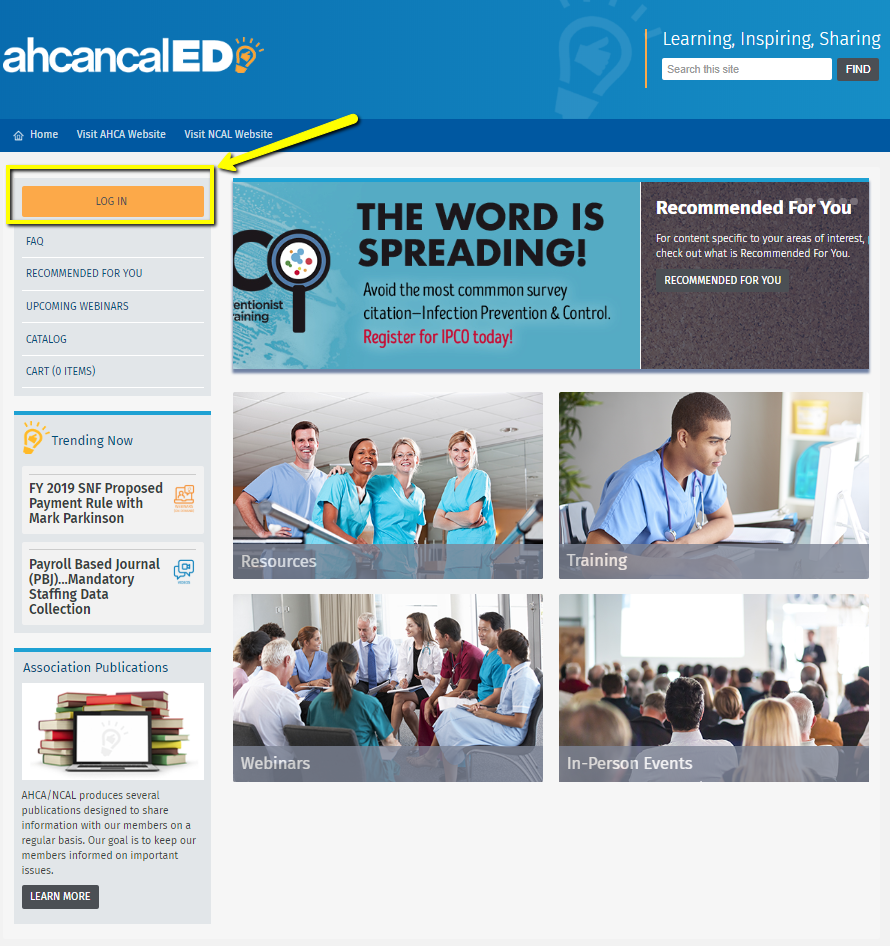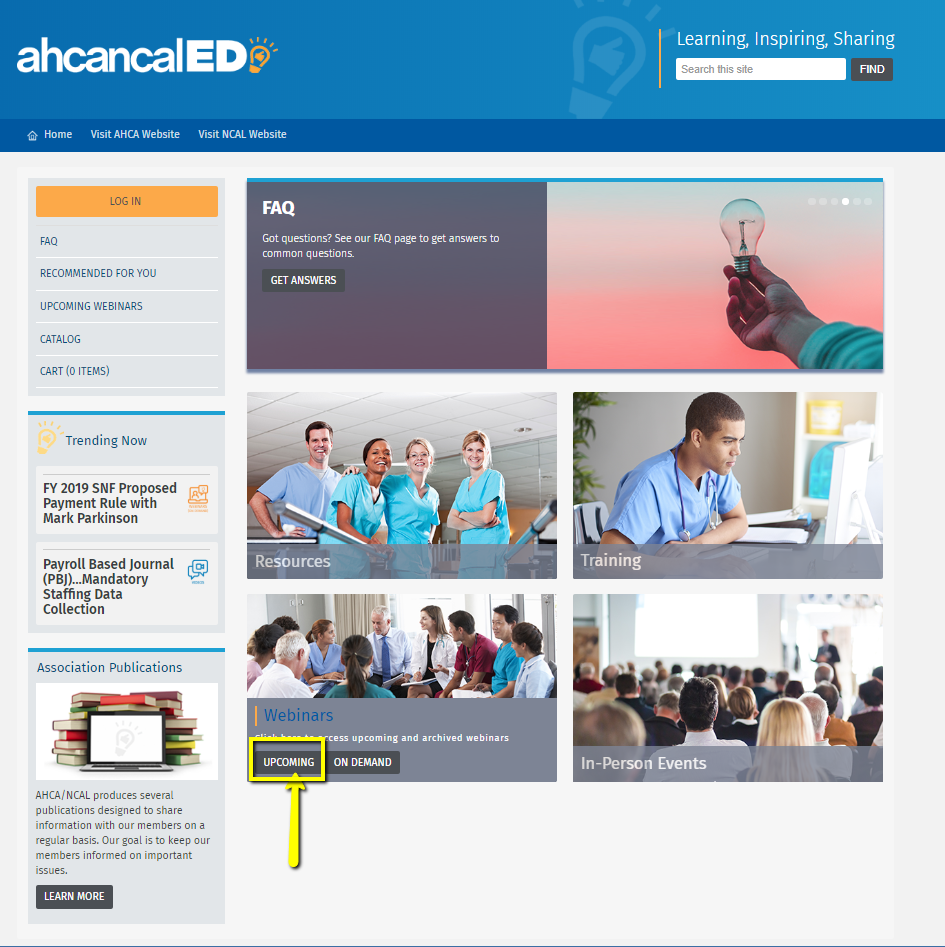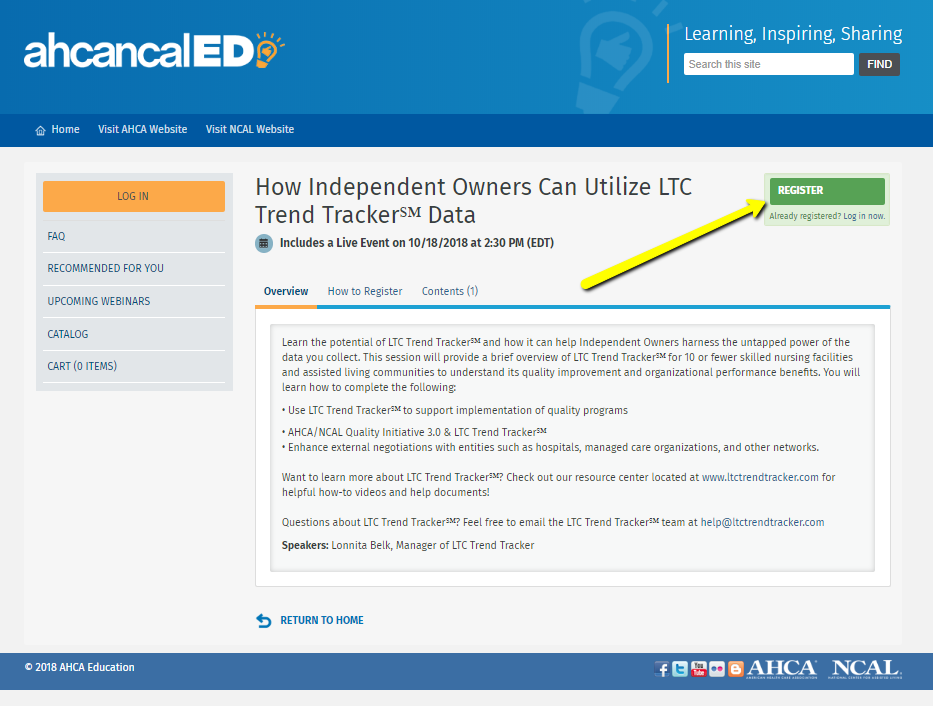
General Resources to Support Implementation and Compliance
-
Register
- Member - Free!
Phase 3 of the RoPs goes into effect on November 28, 2019. AHCA has developed resources to help you navigate the new requirements. This package includes resources applicable to General Resources to Support Implementation and Compliance. Such as:
- Mitigation Action Plan for Adverse Events (Nursing Center and AL)
- Integrating the Requirements of Participation into Your Community Morning Meeting/Routine Monitoring Practices/Audits/QAPI Process
- The Requirements of Participation and Baldrige Connection
- The Requirements of Participation and Baldrige Criteria
© 2022 American Health Care Association. All rights reserved.
All General Resources to Support Implementation and Compliance materials subject to this copyright may be photocopied or distributed for the purpose of nonprofit or educational advancement. The use, photocopying, and distribution for commercial purposes of any of these materials is expressly prohibited without the prior written permission of American Health Care Association.
-
Contains 5 Component(s)
It is critical for nursing centers and assisted living communities to address and mitigate adverse events and potential adverse events. An action plan, otherwise known as a mitigation plan, is a necessary response to adverse events and potential adverse events. For many such events, it is important to respond and start the mitigation process immediately. These tools were developed by members of AHCA’s Survey/Regulatory Committee. Use of these tools does not guarantee regulatory compliance; nursing centers should adapt as needed to ensure compliance with current federal and state requirements. They are not intended as legal advice and should not be used or relied upon as legal advice.

How to Register in ahcancalED
Easy as 1, 2, 3 !
click the
 button found in the upper right corner of your screen or follow these three easy steps below!
button found in the upper right corner of your screen or follow these three easy steps below! Step 1

Go to the ahcancalED site at https://educate.ahcancal.org/and log in using the orange button in the upper left hand corner.
Use your usual user name and password that you would use for LTC Trend Tracker or the AHCA NCAL website.
Don’t have one or can’t remember?
Click the log in button and follow the directions found under the search button that reads-“If you need help retrieving your Username or Password, click here”.
*Please note* you must add your member facility name to your login
Once you are in and can see your name in the upper left hand corner, you are ready to go.
Step 2

From the home page click on a category (Resources, Training, Webinars or Trending Now) For this demonstration, let’s try hovering over Webinars until upcoming webinars displays.
Under “upcoming webinars” go to a product in which you are interested. Click on the title.
You’ll be redirected to the site where you can register for the product. This allows you to view the overview, handouts or resources associated with that product.
Step 3

Almost there!
Click the green “register” button.
Fill out the registration details and voila! The products are yours to use indefinitely and can be found in your dashboard.
FYI: after registering, you will be automatically notified when the recording of the webinar is ready.
Need further help? Email us at educate@ahca.org
We’ll walk you through it.
It is critical for nursing centers and assisted living communities to address and mitigate adverse events and potential adverse events. An action plan, otherwise known as a mitigation plan, is a necessary response to adverse events and potential adverse events. For many such events, it is important to respond and start the mitigation process immediately.
Examples of adverse events/potential adverse events include:
- Falls (not following the care plan, use of gait belt, one vs. two-person transfers)
- Falls with a mechanical lift
- Elopement
- Allegation of abuse or neglect
- Water too hot
- Smoking (supervised vs. unsupervised, with oxygen, defined smoking area, all about safety)
- Bedrails (entrapment, assessment for use)
- Significant medication errors such as cardiac medications, chemo, insulin, morphine, Coumadin
- Served/consumed wrong consistency of food or liquids
- Infection Control – outbreaks (e.g. scabies, bedbugs, MRSA, C-Difficile, Noro Virus, Legionella)
- Fluid restriction not managed or monitored by facility, physician parameters not followed
- Lack of timely or complete assessment of a change in condition
- Pressure ulcer – lack of prevention or following prevention measures
- Grievances and resident council feedback
Objectives:
- Identify adverse events that could potentially have a negative impact on residents as well as on a center’s regulatory compliance.
- Establish a routine root cause analysis process to identify the specific/source, root cause or causal factor of the problem.
- Create a structured process for developing a mitigation plan to address the adverse event/potential adverse event and minimize similar events for all residents:
- Review the guidance for determination of avoidable versus unavoidable event
- Complete the Initial Mitigation Action Plan
- QAPI members complete the formal documentation of the Mitigation Action Plan
- Use information learned by sharing results and Plan with the QAPI committee for continued monitoring.
Note: These tools were developed by members of AHCA’s Survey/Regulatory Committee to assist centers and communities in addressing adverse events and potential adverse events, documenting and tracking the steps they have taken, and identifying best practices for ongoing improvement. Use of these tools does not guarantee regulatory compliance nor mitigate potential liability. Providers should adapt their tools, policies, and processes as needed to ensure compliance with current federal and state requirements and use both professional judgement and the advice of legal counsel in determining whether or how to share these mitigation tools.
© 2022 American Health Care Association. All rights reserved.
All Nursing Centers Action Plan Response for Adverse Events materials subject to this copyright may be photocopied or distributed for the purpose of nonprofit or educational advancement. The use, photocopying, and distribution for commercial purposes of any of these materials is expressly prohibited without the prior written permission of American Health Care Association.
You are also encouraged to register for the following free resource:
Tools to Prevent and Address Resident to Resident Mistreatment
-
Contains 5 Component(s)
It is critical to address and mitigate adverse events and potential adverse events. An action plan, otherwise known as a mitigation plan, is a necessary response to adverse events and potential adverse events. For many such events, it is important to respond and start the mitigation process immediately. These tools were initially developed by members of AHCA’s Survey/Regulatory Committee and adapted for assisted living communities to assist providers in addressing adverse events and potential adverse events, documenting and tracking the steps they have taken, and identifying best practices for ongoing improvement. Communities may use different titles or terms than the action plans, such as Director of Health Services instead of Director of Nursing, or service plan instead of care plan. Please adapt the plans to reflect your AL community. Use of these tools does not guarantee regulatory compliance nor mitigate potential liability. Providers should adapt their tools, policies, and processes as needed to ensure compliance with current federal and state requirements and use both professional judgement and the advice of legal counsel in determining whether or how to share these mitigation tools.

How to Register in ahcancalED
Easy as 1, 2, 3 !
click the
 button found in the upper right corner of your screen or follow these three easy steps below!
button found in the upper right corner of your screen or follow these three easy steps below! Step 1

Go to the ahcancalED site at https://educate.ahcancal.org/and log in using the orange button in the upper left hand corner.
Use your usual user name and password that you would use for LTC Trend Tracker or the AHCA NCAL website.
Don’t have one or can’t remember?
Click the log in button and follow the directions found under the search button that reads-“If you need help retrieving your Username or Password, click here”.
*Please note* you must add your member facility name to your login
Once you are in and can see your name in the upper left hand corner, you are ready to go.
Step 2

From the home page click on a category (Resources, Training, Webinars or Trending Now) For this demonstration, let’s try hovering over Webinars until upcoming webinars displays.
Under “upcoming webinars” go to a product in which you are interested. Click on the title.
You’ll be redirected to the site where you can register for the product. This allows you to view the overview, handouts or resources associated with that product.
Step 3

Almost there!
Click the green “register” button.
Fill out the registration details and voila! The products are yours to use indefinitely and can be found in your dashboard.
FYI: after registering, you will be automatically notified when the recording of the webinar is ready.
Need further help? Email us at educate@ahca.org
We’ll walk you through it.
It is critical to address and mitigate adverse events and potential adverse events. An action plan, otherwise known as a mitigation plan, is a necessary response to adverse events and potential adverse events. For many such events, it is important to respond and start the mitigation process immediately.
Examples of adverse events/potential adverse events include:
- Falls (not following the care plan, use of gait belt, one vs. two-person transfers)
- Falls with a mechanical lift
- Elopement
- Allegation of abuse or neglect
- Water too hot
- Smoking (supervised vs. unsupervised, with oxygen, defined smoking area, all about safety)
- Bedrails (entrapment, assessment for use)
- Significant medication errors such as cardiac medications, chemo, insulin, morphine, Coumadin
- Infection Control – outbreaks (e.g. scabies, bedbugs, MRSA, C-Difficile, Noro Virus, Legionella)
- Lack of timely or complete evaluation of a change in condition
- Pressure ulcer – lack of prevention or following prevention measures
- Grievances and resident/tenant council feedback
Objectives:
- Identify adverse events that could potentially have a negative impact on residents/tenants as well as on a community’s regulatory compliance.
- Establish a routine root cause analysis process to identify the specific/source, root cause or causal factor of the problem.
- Create a structured process for developing a mitigation plan to address the adverse event/potential adverse event and minimize similar events for all residents/tenants:
- Complete the Initial Mitigation Action Plan
- QAPI members complete the formal documentation of the Mitigation Action Plan
- Use information learned by sharing results and Plan with the QAPI committee for continued monitoring.
Note: These tools were initially developed by members of AHCA’s Survey/Regulatory Committee and adapted for assisted living communities to assist providers in addressing adverse events and potential adverse events, documenting and tracking the steps they have taken, and identifying best practices for ongoing improvement. Communities may use different titles or terms than the action plans, such as Director of Health Services instead of Director of Nursing, or service plan instead of care plan. Please adapt the plans to reflect your AL community.
Use of these tools does not guarantee regulatory compliance nor mitigate potential liability. Providers should adapt their tools, policies, and processes as needed to ensure compliance with current federal and state requirements and use both professional judgement and the advice of legal counsel in determining whether or how to share these mitigation tools.
© 2022 American Health Care Association. All rights reserved.
All Assisted Living Action Plan Response for Adverse Events materials subject to this copyright may be photocopied or distributed for the purpose of nonprofit or educational advancement. The use, photocopying, and distribution for commercial purposes of any of these materials is expressly prohibited without the prior written permission of American Health Care Association.
You are also encouraged to register for the following free resource:
Tools to Prevent and Address Resident to Resident Mistreatment
-
Contains 1 Component(s)
This tool was created by the AHCA Survey & Regulatory Committee, with input from AHCA staff. The intent of this tool is to support Administrators, Directors of Nursing and the Interdisciplinary Team members with integrating the new CMS Requirements of Participation (RoP) into community practices.
This tool was created by the AHCA Survey & Regulatory Committee, with input from AHCA staff. The intent of this tool is to support Administrators, Directors of Nursing and the Interdisciplinary Team members with integrating the new CMS Requirements of Participation (RoP) into community practices. Although extensive, this checklist can be used to assist a community with RoP compliance, the AHCA Quality Awards journey, and potentially to increase CMS Five-Star ratings.
For communities with a new Interdisciplinary Team, this tool may be used daily. As the team becomes familiar with the requirements, this tool may be used for auditing purposes and QAPI processes. For example, the Administrator could choose a section to review each day and cycle through it a few times until it becomes routine. Team members would become aware of requirements that are their responsibility and would be able to bring that information to the morning meeting, or to track and trend. Identified areas for improvement may be integrated into the QAPI program. Note that this is not an exhaustive list of requirements but is a guide to support daily operations and longer-term planning within your community.
This tool can be used for the following:
- Agenda for Morning Meeting
- Assign sections to specific members of Interdisciplinary Team to report on
- Pathway to create auditing tools
- Review for QAPI Meetings
- A checklist for survey preparedness
© 2022 American Health Care Association. All rights reserved.
All Integrating the Requirements of Participation into Your Community Morning Meeting/Routine Monitoring Practices/Audits/QAPI Process materials subject to this copyright may be photocopied or distributed for the purpose of nonprofit or educational advancement. The use, photocopying, and distribution for commercial purposes of any of these materials is expressly prohibited without the prior written permission of American Health Care Association.
